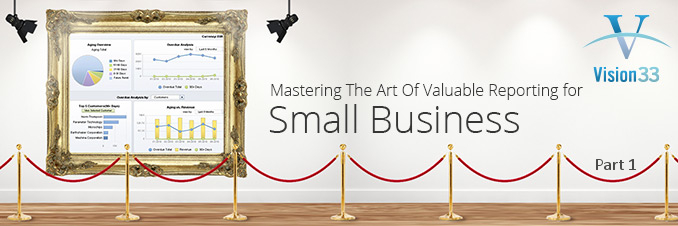Bboxx Tackles Energy Poverty With SAP Business ByDesign
SAP Business OneSAP Business ByDesign gives Bboxx tools like real-time data and customizable reports, increasing...

March 11, 2014
Blog > Mastering the Art of Reporting - Part One
In our last blog post, we discussed how managers of small and medium sized enterprises (SMEs) can make better business decisions by leveraging custom reporting and analytical tools offered by an ERP solution such as SAP Business One. In addition to offering managers a broad canvas for creating custom business reports to match your organization’s informational requirements, SAP Business One also offers many standard, ready-made reports that draw on critical information from a palette of different functional areas within your business including; accounting, sales, purchasing, production, inventory, service, and operations.
If you missed the recent webinar; Mastering the Art of Reporting, SME expert Carl Lewis demonstrated not only how managers and other decision makers in an organization employ useful standard reports in different business scenarios, but also how they can get access to a deeper level of analysis to provide a more detailed picture of business’ operations.
The first scenario looks at standard reporting useful for a sales manager; the Sales Analysis Report. From within SAP Business One, Sales Managers can configure a dashboard where sales managers can add routine functions for easy access. Once configured, sales managers can make a single click to run a Sales Analysis Report and you can select different options to choose such as date range. Double clicking on a particular line will then expand into a more detailed analysis of all the invoices for that customer over the selected range.
However, going a level deeper, the Sales Analysis Report can be carried out at the item level to see all of the transactions relating to the item. Again, by expanding the line of detail, you can now get access to all the documents relating to the item in question. When analyzing the actual inventory, there are other reports that are available including inventory status, available to promise, and the inventory posting list, among others. In addition to a high level of detail afforded by SAP Business One's standard reports, data captured in the system is interactive and available in real-time to support Sales Managers’ decision making.
Looking at a more advanced level of reporting in a sales scenario, Sales Managers can use a Budget vs. Actual report to provide a deeper analysis of customer performance. Through the use of a “Blanket Agreement,” Sales Managers can set up an agreed upon price with the customer if they purchase a certain amount over a period of time, in addition to a budget allocated to this customer for a specified date range. The “Blanket Agreement” brings together any documents in the system that is created relative to the product agreement.
Further, a Sales Manager could create an even more detailed Budget vs. Actual report that enables them to create a forecast for a specific customer, specific items and the quantity you believe they will purchase by day, week, or month. From here - you can create a report to look at purchases by date.
Continue reading Mastering the Art of Reporting part two for an overview of how Purchasing Agents can leverage the standard Purchasing Analysis Report found in SAP Business One for transparency across vendor relationships. Additionally, you can watch Mastering the Art of Reporting pre-recorded webinar below for more examples of how to use standard reporting in SAP Business One in a variety of business scenarios to access to valuable information for better decision making.
Subscribe to our newsletter to receive our latest blog posts, case studies and ERP news delivered straight to your inbox.
SAP Business ByDesign gives Bboxx tools like real-time data and customizable reports, increasing...
With the right technology, reporting is fast and easy. Here are some of the most common reporting...
Watch the H&S Building Supplies success story to learn how SAP Business One’s all-in-one solution...
Recieve our latest blog posts, case studies, and ERP news
delivered straight to your inbox.